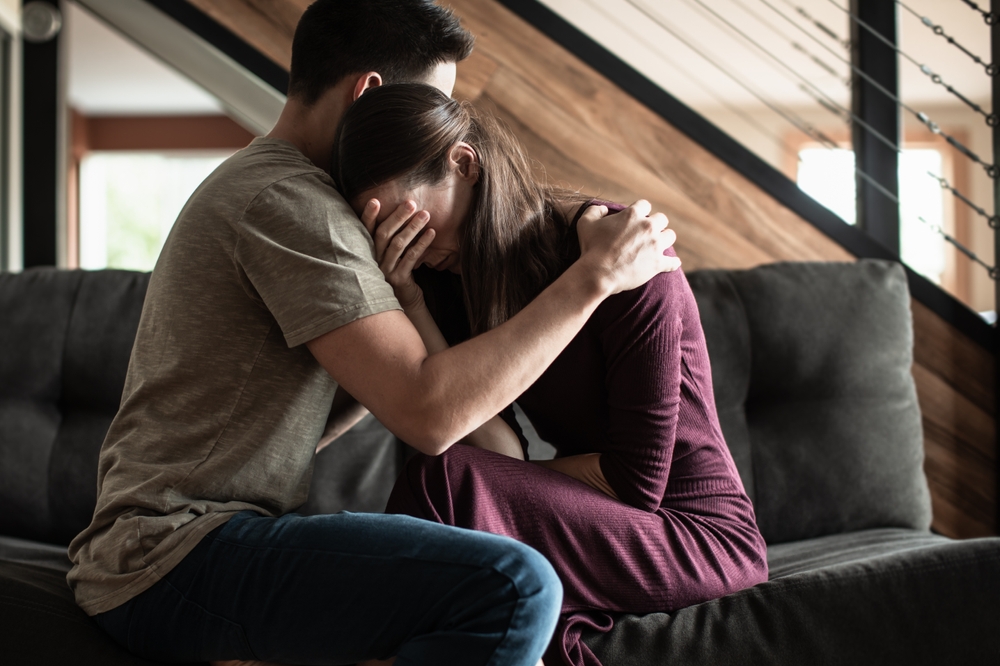“My Wife Died Because of My Pride”

Sometimes it takes a single moment to change a life forever. One careless word, one stubborn silence, one missed chance to forgive—these choices seem small in the moment, but they carry consequences far heavier than we imagine. Pride convinces us we have time. Time to make up, time to explain, time to love tomorrow. But tomorrow is never promised, and love withholds nothing for those who wait too long.
This is the story of a husband who discovered that truth in the most devastating way. What began as a trivial argument over something as ordinary as butter on bread spiraled into days of silence, each one colder than the last. He thought there would always be another night, another morning, another chance to soften his heart. But life proved otherwise. His wife’s final moments were not spent in reconciliation but in desperation—reaching for help that never came. By the time he understood what his pride had cost, the chance to make things right was gone forever.

The Silent Walls We Build
It began with something so ordinary, almost laughably small, that most people wouldn’t think twice about it. A piece of bread, spread unevenly with butter. That was all it took to light a spark of irritation that grew into a fire. Instead of letting it go, instead of taking a deep breath and realizing how insignificant it was, he allowed his annoyance to spill out in the form of harsh words. Words that cut through the air like glass. That morning, the house filled not with laughter or warmth but with silence, a silence heavy enough to last for days. What should have been a passing moment, one that could have been softened with a smile or a hug, instead became the first stone laid in a wall built of pride. And with every hour of silence that followed, that wall grew taller and thicker.
For him, the argument was no longer about the bread. Pride transformed it into something much larger, something about principles and who should bend first. He convinced himself that to apologize would be weakness, that his dignity rested on her taking the first step. For her, however, it was never about the argument at all. What she longed for was the tenderness that once came so easily between them—the exchange of small smiles over dinner, the comfort of familiar rituals like sharing a song in the shower, the reassurance that even in conflict, love would always have the final word. She reached out in quiet ways, offering a gentle greeting across the table, a soft smile that carried forgiveness, even a tender pat on the shoulder in the middle of the night. Each time, he held back, letting his silence answer for him. His ego told him this was victory, but in truth, he was only deepening the fracture.
By the time the weight of what had been lost finally struck him, the moment for repair was gone. His wife, the woman who had tried again and again to bridge the gap, had slipped away in the night. The hand he brushed aside at 3 a.m. had not been reaching for reconciliation—it had been reaching for air. Her last act was not a plea to end the argument but a cry for help that went unheard. The realization shattered him: his silence, his stubbornness, his refusal to soften had cost him more than the fight. It had cost him her life. And that is the unbearable truth of pride—it blinds us until the very things we hold back from saying or doing become the regrets we must carry forever.

The Chains of Pride
Pride has a strange way of disguising itself as strength. It whispers in our ear that to apologize is to surrender, that to soften our tone is to lose ground. In reality, pride is not power at all—it is fear dressed in armor. We fear being seen as weak, we fear rejection, we fear that if we yield first, the other person will hold the upper hand. So we cling to silence, thinking it shields us, but what it really does is suffocate the love that could have been expressed. Psychologists describe pride as one of the most destructive emotions in relationships because it places ego above connection. Instead of asking, “How do we heal this?” pride insists, “Who will bow first?” That stubborn posture builds invisible walls, walls so high that sometimes not even tragedy can break them in time.
When pride takes root, it convinces us that the small acts of love don’t matter. A hug withheld, a smile ignored, a word left unsaid—these moments seem tiny when measured against the weight of an argument. Yet it is often the smallest gestures that mean the most. Pride numbs us to their importance. We forget that people don’t need us to be perfect; they need us to be present. When someone reaches out with kindness, ignoring it is not neutrality—it is rejection, a wound carved deeper than any harsh word. Over time, this creates a cycle of distance, where both sides wait for the other to move, and in the waiting, love quietly erodes.
What makes pride so dangerous is that it thrives in the illusion of endless time. We imagine there will always be another morning to say sorry, another evening to smile across the table, another chance to turn toward each other in bed instead of away. But life rarely offers unlimited chances. Illness, accidents, or sudden loss can shatter the illusion in an instant. The man in this story believed he had time. Time to stay silent, time to prove a point, time to wait her out. But time ran out, and he was left with only regret. Pride’s most devastating lie is that reconciliation can always come later. The truth is, later does not always arrive.
This is why pride is not just a personal flaw; it is a thief. It robs us of joy, of closeness, of the chance to create memories worth cherishing. The man’s story is a sobering reminder that pride can cost more than an argument—it can cost a lifetime. And when that price is finally revealed, it is always too high.

The Fragility of Life
Life is breathtakingly fragile, and yet we treat it as though it is guaranteed. We plan for tomorrow, we assume the people we love will always be there when we get home, and we carry on arguments as if time bends to our stubbornness. But the truth is that every single day is a gift, one that can be taken without warning. His wife’s death illustrates this painful reality: one night, she was humming their favorite song; by morning, she was gone. The rhythm of life can be steady one moment and vanish the next, and we never know when that final conversation, final touch, or final smile will arrive.
We often tell ourselves that apologies can wait, that tomorrow we will patch things up, that someday soon we will say the words we held back. But death and illness do not respect our plans. The universe does not pause its cycles to give us time to fix our mistakes. When his wife reached out in the night, it was not just a request for reconciliation; it was her last chance to be saved. He could not see it because he assumed there would be another day, another morning to decide whether to speak. The cruelty of life’s fragility is that it does not announce when the clock is about to stop. That is why every moment of love withheld is a gamble we cannot afford.
The tragedy of his loss is not only that she died but that she died in silence, lying beside the very person who could have saved her. This sharp truth forces us to reflect on how quickly we take each other for granted. The people closest to us—the ones whose presence feels so certain—are often the ones we delay forgiving or delay loving out loud. We assume they will understand. We assume they will wait. But love left unspoken becomes grief, and forgiveness left unoffered becomes regret.
When we accept how fragile life is, it transforms the way we choose to live. Every hug, every smile, every kind word becomes urgent, not optional. Each apology becomes an act of love, not weakness. His story is heartbreaking, but it is also a reminder: life is a fleeting candle, and we never know when the flame will be snuffed out. The only wise choice is to cherish the light while it still burns.
The Power of Forgiveness
Forgiveness is not about proving who was right or wrong; it is about choosing love over pride. It takes courage to say, “I’m sorry,” but it also takes humility to accept an apology. In a relationship, forgiveness is the lifeblood that keeps intimacy alive. Without it, even the strongest bonds weaken. Studies on marriage and long-term partnerships show that couples who learn to forgive quickly tend to have greater resilience, lower stress, and deeper satisfaction. Forgiveness is not a one-time act but a daily practice, a commitment to prioritize connection over ego.
What makes forgiveness powerful is that it breaks the cycle of distance. It says, “I value us more than this argument.” When the man ignored his wife’s “hi,” he missed an invitation to forgiveness. That small word carried more weight than he realized—it was her way of saying she was ready to let go of the fight, ready to return to love. Forgiveness could have ended the silence in that moment, could have restored their closeness, could have saved not just the relationship but perhaps even her life. Every time we choose not to forgive, we allow distance to harden into permanence.
Forgiveness does not mean excusing harmful behavior or pretending wounds never happened. It means choosing to free both ourselves and others from the chains of resentment. Pride holds grudges tightly, but forgiveness releases them. This is why forgiveness feels light—it allows love to flow again. To say “I forgive you” is to clear away the walls pride builds, creating space for intimacy to return. Relationships do not thrive on perfection; they thrive on repair.
In the end, forgiveness is not just a gift we give others but a gift we give ourselves. The man’s grief is heavy because forgiveness never had its chance to heal. If he could go back, he would no doubt trade every victory of pride for a single moment of grace. His story warns us that forgiveness delayed is forgiveness denied, and the cost of delay is sometimes unbearable.
Love Over Ego
The deeper lesson in this story is that love and ego cannot coexist in the same space. Ego demands to be right; love seeks to understand. Ego craves recognition; love offers compassion. Ego waits for the other to move first; love takes the step without hesitation. In every conflict, we are faced with a choice: protect the ego or protect the bond. Too often, we let ego win. We tell ourselves that giving in will make us look weak, when in truth, it is love that requires the greater strength.
Real strength is not found in standing tall behind walls of pride but in kneeling low enough to say, “I was wrong.” Real courage is not refusing to bend but daring to be vulnerable, even when it feels uncomfortable. The man in this story thought that holding out made him strong, but the reality is that his silence left him powerless in the face of loss. Love could have been his strength, but he let ego dictate his actions. The result was irreversible.
When we live with love at the center, everything shifts. Arguments lose their power to divide, because love chooses reconciliation over victory. Misunderstandings become opportunities to grow, not excuses to withdraw. Even small annoyances—the unevenly buttered bread, the habits that once irritated us—transform into reminders of the unique, irreplaceable presence of the one we cherish. Ego magnifies flaws; love magnifies value.
This is why love must be chosen again and again, not just in grand gestures but in everyday moments. To laugh instead of criticize, to smile instead of ignore, to embrace instead of turn away—these are the ways love conquers ego. If his story teaches us anything, it is that the cost of choosing ego can be everything. And once lost, no amount of pride can ever bring love back.
A Call to Live Differently
This story forces us to confront a difficult truth: life is too short, and love is too precious, to waste on pride. The bread, the arguments, the silence—none of it mattered in the end. What mattered was the chance to love while there was still time. His regret now echoes as a warning for all of us: do not wait to say “I’m sorry,” do not wait to say “I love you,” do not wait to choose compassion over stubbornness. Every day that we delay, we gamble with moments that may never return.
To live differently means to live awake, to recognize the fragility of life and the urgency of love. It means hugging tighter, speaking softer, forgiving quicker. It means refusing to let ego silence the heart. In our relationships—whether with a spouse, a parent, a child, or a friend—we must remember that the bond is always more important than the battle. To walk away in silence may feel powerful in the moment, but it is love that will carry us when pride has nothing left to stand on.
So let his story be more than just a tragedy; let it be a mirror. Look into it and see where pride has built walls in your own life. See the faces of those you love and imagine what it would feel like if tomorrow never came. Would you regret the silence? Would you regret the words left unsaid? If the answer is yes, then the time to act is now.
The call is simple but profound: forgive quickly, love loudly, and never let ego dictate the last word. Because in the end, pride wins nothing, but love wins everything.
Loading...

